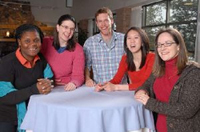Editor’s note: This is the first in series of articles leading up to the Uniting General Council of the World Alliance of Reformed Churches and the Reformed Ecumenical Council to create the World Communion of Reformed Churches. Jerry Van Marter of the Presbyterian News Service will serve as English-language reporter for the Council event.
When delegates to the Uniting General Council (UGC) gather this June here for a Pow-Wow, they will be celebrating at the heart of this city’s faith-filled history.
It is here, in a culturally rich city near the shores of mighty Lake Michigan, that the World Communion of Reformed Churches (WCRC) will be born during the Uniting General Council (UGC), June 18-28. The gathering unites the World Alliance of Reformed Churches (WARC) and the Reformed Ecumenical Council (REC) into a single worldwide Reformed body.
And it is here at the Pow-Wow site, Ah-Nab-Awen Park on the Grand River, that the Odawa tribe fished and farmed long before European settlers established Baptist and Catholic missions in the early 1800s.
It is a fitting gathering site for delegates and visitors from 107 countries, 227 member churches and countless cultural expressions of the Christian faith.
Today, the park is bounded by a public museum and the Gerald R. Ford Museum, named after the United States’ 38th president who grew up in the city. Across the river looms a convention center, luxury hotels, lofty condominiums and a major medical complex — symbols of a city built on furniture, faith and family.
This is Grand Rapids, home to a large Reformed community, a thriving arts scene and buzzing downtown business area, despite the woes of a struggling economy.
Though about 25 per cent of its 192,000 residents live below poverty level, immigrants from around the world have found a happy home in Grand Rapids and surrounding Kent County communities.
Bernard Ayoola is the Nigerian co-pastor of African Community Fellowship Christian Reformed Church. He, his wife and four children have embraced Grand Rapids’ cultural and natural delights.
“We love it here,” Ayoola says. “There are so many things to see in Grand Rapids. The culture is very rich.”
The Christian Reformed Church is based in Grand Rapids and the Reformed Church in America has its regional headquarters in the city. Yet the culture is diverse despite the city’s reputation as a bastion of the Dutch Reformed tradition.
The city is set in the region of Kent County whose 700-plus congregations include Koreans, Bosnians, Latin Americans and others worshipping in more than two dozen languages. These more recent immigrants pray along with the descendants of Dutch, English, German and Polish immigrants of long ago.
Even earlier, around the time of Christ, Hopewell Indians built burial mounds to honor their dead along the Grand River. White settlers later leveled them, an act of sacrilege brought by European entrepreneurs along with fur trading and whiskey.
Organizers hope the June Pow-Wow will help heal the injustice to Native Americans. Tribal leaders will drum and dance in the park across from the Amway Grand Plaza Hotel, built by the DeVos and VanAndel families whose philanthropy has helped revive a once-desolate downtown.
West Michigan-based Meijer stores help offset the area’s economic downtown. Once known as America’s furniture capital, the area still is home to office furniture giants Steelcase and Herman Miller. The top employer is Spectrum Health, a medical complex surrounded by a university medical school and a cancer research institute.
Education also employs many, with several colleges including UGC host Calvin College. Founded as a seminary for Christian Reformed ministers, it is a nationally recognized liberal arts school with a distinctively Reformed character.
The city has been energized by faith since its inception. Early church members founded hospitals, led banks and ran government. Current mayor George Heartwell is an ordained minister, and faith-based agencies such as the Grand Rapids Area Center for Ecumenism (GRACE) play prominent roles in combating racism, housing the homeless and easing hunger.
“From the earliest settlers to today’s global immigrants, faith ties together the diverse people of Grand Rapids”, says Calvin College historian James Bratt. “Religion is the root that feeds them into the rest of their lives.”

